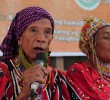United in what?
It is difficult to see how the administration slate will be able to project itself as a united team given the impression that its formation was made in haste, that it included “rejects” from the opposition ticket as well as two movie and TV actors whose selection was based on presumed crowd-drawing assets.
President Arroyo needs to work hard in order to match and fend off the opposition’s strategy to turn the congressional race into a “referendum” for the chief executive. Campaigning on a platform of “economic growth,” which she and Angara have so declared, will not win votes simply because there is nothing they can show to convince the mass electorate.
On the other hand, Binay and the opposition candidates should be able to give substance to the strategy of using the election as an issue of presidential accountability. Reviving the “Hello, Garci” election controversy can be an effective strategy because of its “issue recall” advantage but it must not be linked narrowly to what some opposition stalwarts aim of transforming the election into a choice between Arroyo and Estrada.
Accountability is a legitimate and principled campaign issue so long as it is interlocked with the mass electorate’s immediate concerns: the abuse of power, gross and systematic violations of human rights and political repression, the U.S.-supported war on terror, labor wage, rising unemployment and poverty, corruption and rising criminality, military discontent, and so on.
Another common issue which the GO and its guest candidates � Villar and Pangilinan � can take a stand is Mrs. Arroyo’s plan to abolish the Senate and which will likely be revived in a constitutional change that she and her allies will pursue after the mid-term elections.
Even if, however, the opposition will be able to win sizeable seats in the senatorial poll � as some political forecasts predict – that will not be enough to ensure the removal of Arroyo. They should be able win at least the required minimum number of seats out of the present 212 elective positions in the House of Representatives to be able to make a go for a third and possibly successful impeachment against the President.
It takes principled positions to be able to rise up to the challenge of the electoral process. It takes convincing the electorate who have long been sickened by elections that mean nothing to their lives and future that this one is more than just a choice between Estrada’s candidates and Arroyo’s candidates and is, therefore, different. The opposition should be able to show that this is beyond ousting Arroyo and beyond retaking power. #
CenPEG is a public policy center set up shortly before the May 2004 elections to help promote people empowerment in governance and democratic representation of the marginalized poor in an elitist and patronage-driven electoral and political system. It conducts research/policy study, education and trainings on governance and people empowerment. To pursue its programs in research and education-training, CenPEG taps a wide pool of political analysts, public policy experts and academic scholars for their expertise and experience in public governance as well as in grassroots empowerment.
[tags]davao today, philippine politics, 2007 elections, gloria macapagal-arroyo [/tags]
2007 Elections









